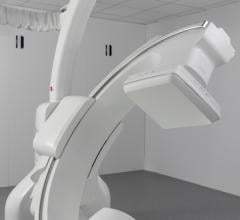June 7, 2023 — GE HealthCare announced the FDA clearance and launch of Sonic DL – a state-of-the-art deep learning-based technology designed to dramatically accelerate image acquisition in magnetic resonance imaging (MRI). Sonic DL enables new imaging paradigms, such as high-quality cardiac MRI in a single heartbeat. This breakthrough expands GE HealthCare’s industry-leading AI-enabled solutions portfolio.
Cardiac MRI is the gold standard for assessing the structure and function of the heart in cardiovascular disease; however, its adoption globally remains relatively low, in part due to lengthy exam times. The current acquisition speed of MRI is too slow to capture the heart's contraction in real time, therefore requiring several heartbeats and multiple breath-holds. This process is time-consuming, prone to image quality degradation, and exhausting for patients. Consequently, there is a pressing need to address the growing demand for fast, high-quality, and comfortable cardiac MR imaging.
To address this need, GE HealthCare is introducing Sonic DL for cardiac MRI. Sonic DL technology is designed to scan up to 12 times faster compared to conventional methods, enabling rapid cardiac MR functional imaging in as fast as a single heartbeat, matching the speed of MRI to the speed of physiology. This advancement minimizes or removes the need for repetitive patient breath holds, simplifying procedures and expanding the pool of patients eligible for cardiac MRI to include arrhythmic patients and those with difficulty holding their breath.
“Sonic DL emerges as a game-changer in the field of cardiac imaging,” explains Dr. Gianluca Pontone, Director of Perioperative Cardiology and Cardiovascular Imaging Dept., Centro Cardiologico Monzino. “By capturing images within a single heartbeat, this cutting-edge technology addresses the unique needs of patients who face challenges in breath-holding, suffer from advanced heart failure, or have arrhythmias. The significance of this capability cannot be overstated, as it ensures a smoother and more comfortable experience for patients during MRI exams. Moreover, Sonic DL’s ability to significantly reduce scan times mitigates the occurrence of motion artifacts that can compromise image quality, paving the way for more accurate and reliable diagnoses.”
Sonic DL’s capability to reduce cardiac MRI scan times by up to 83% also helps enhance productivity in radiology departments, streamlining workflows, alleviating backlogs, and reducing the burden on staff. Its cutting-edge technology tracks the beating heart with unparalleled image quality and overcomes the limitations of conventional acceleration techniques.
“Sonic DL is a paradigm shift for MR enabling high-quality imaging in a single heartbeat,” said Jie Xue, President & CEO, Global MR, GE HealthCare. “It greatly expands patient access and improves diagnostic value for patients who need it the most but previously couldn’t be scanned successfully. Our industry-leading deep learning technology, AIR Recon DL, has already benefited more than 10 million patients. We expect Sonic DL to further extend the lead of GE HealthCare in leveraging AI to advance healthcare and benefit patients around the world.”
The innovation behind Sonic DL is a testament to GE HealthCare's commitment to advancing MRI through cutting-edge AI deep learning technology. GE HealthCare’s goal is to expand this technology across all anatomies. The combination of Sonic DL and AIR Recon DL represent a powerful solution suite for improved speed and image quality in MR exams.
For more information: gehealthcare.com


 February 05, 2026
February 05, 2026 









